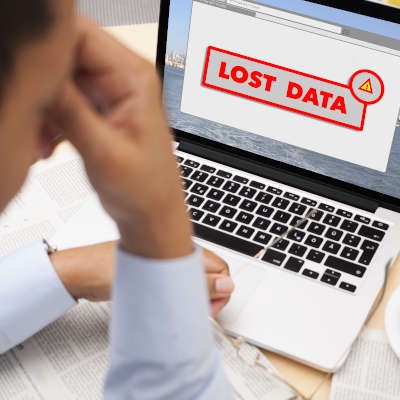We’re halfway through the year, and I don’t think anyone expected 2020 to go the way it has. Many business owners are being extra cautious about their spending and doing what they can to prevent unexpected interruptions to their business. One costly interruption all businesses need to continue to prevent is data loss.
Data loss can happen a few different ways. Malware can cause irreversible data loss, and ransomware can cause reversible data loss, provided you pony up the ransom to hackers. Your end-users can mistakenly cause data loss by overwriting or deleting data, but a disgruntled employee could do even more damage intentionally. Your data is stored on delicate, mechanical devices that are extremely sensitive to shock and damage. Hard drives don’t last forever and will eventually fail, so if your data is only stored in one place, it’s just a matter of time.
Data Loss Hurts in a Lot of Places
When you lose any amount of data, it can be a burden on your company. Take a single sales proposal. Let’s say a salesperson is working on a proposal and it accidentally gets overwritten or deleted. If they can’t restore it, they need to backtrack and do some of that work over again. That can lead to fewer sales calls that employees can handle or missing a deadline that causes them to lose the sale itself.
If an entire hard drive on your server is lost, you are going to lose a lot more than a single document. That hard drive might contain years of client data, the database for your CRM, or your next six months of marketing materials. Suddenly it affects your entire company in drastic ways.
Not only that, but depending on the type and severity of the data loss event, there are specific laws that require you to report it. These mostly deal with data breaches, but a breach can still lead to a loss of data (though it doesn’t have to).
A lost or stolen mobile device or laptop could be considered data loss and should trigger action from the company to prevent further loss and in some cases notify the proper authorities and clients. We’ll be sure to talk more about data breaches in an upcoming article.
Just Prevent Data Loss
It’s simple, just don’t lose data. Your business doesn’t need to deal with the fallout of data loss. Fortunately, it’s not particularly complicated or even comparatively expensive to prevent data loss. You simply need to back your data up securely.
Your data - all of your data - needs to be stored in three places. One of those places is its original location - on your computer or more preferably, on your network’s server. It’s also a good practice to have your data stored on multiple hard drives within your server (called a RAID array). There are multiple types of RAID setups, but they tend to lead to better performance and better data security.
The second place that all of your data needs to be kept is on a completely separate device on your network. This could be another server, a Network Attached Storage (NAS) device, or better yet, a dedicated backup device designed to make regular ongoing backups throughout the day and push a copy of the data to a third location.
That third location shouldn’t be within your company walls. It should exist in a separate physical location, away from your business. This way, if your business were to suffer from a fire, a flood, a power surge, or any other damage-causing event, your data will be safely replicated and accessible. If your backup device can automatically push backups to the cloud, it will ensure that your business has a chance to function if a disaster were to strike.
We rely on a BDR (Backup and Disaster Recovery) device to handle our company’s data. It does everything we mentioned above, and then some. It replicates all of our data throughout the day, and securely encrypts it and stores it offsite just in case. We’re able to quickly restore data from it if we need to, and if we experience a hardware failure with our server, we can quickly deploy everything from our BDR so we are back up and running quickly without suffering from a major outage.
Our clients love the protection that a BDR brings, and we even run regular tests to prove that the BDR is doing its job by simulating a real disaster and having employees work from the backed-up data.
Data loss is the last thing that any business needs to be dealing with, and it is a relatively easy thing to prevent at the base level. Reach out to XFER at 734-927-6666 / 800-GET-XFER to learn how we can prevent data loss for your company.
![]()


Comments